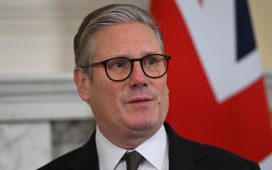 BBC
BBCEducation Secretary Bridget Phillipson has said “working people” would not see higher taxes on their payslips following Wednesday’s Budget.
During the election, Labour promised not to increase National Insurance, income tax or VAT on working people but ministers have since come under pressure to define exactly who that covers.
Appearing on Sunday with Laura Kuenssberg, Phillipson said the manifesto pledge referred to people “whose main source of income is the income they earn from going out to work”.
She avoided saying if she thought business owners could be considered working people.
Conservative shadow science secretary Andrew Griffith accused Labour of coming into government on “a false prospectus that things would be easy”.
“They essentially lie to the British people in terms of their plans,” he added.
Shortly after coming into power, the Labour government accused the Conservatives of leaving a “£22bn black hole” in public finances.
In order to avoid cutting public spending, Chancellor Rachel Reeves is expected to announce some tax rises when she sets out the Budget next week.
The government is looking at increasing tax on asset sales, such as shares and property, changes to inheritance tax and freezing income tax thresholds.
Continuing the previous government’s freeze of tax thresholds would see more people move into higher tax bands and could raise an estimated £7bn for the government.
Speaking on Sunday, Phillipson said she could not give specific information on what would be in the Budget but said: “When people look at payslips they will not see higher taxes.
“That is a very clear commitment.”
She added that the government wanted to “break the doom loop of ever higher taxes on working people and lower growth”.
Asked if she, as a minister earning up to £160,000, counted as a working person, she replied: “My income derives from my job and I’ll pay whatever taxes are required of me.”
On whether a small business owner would count as a working person, she said she could not go into specific details about “who may or may not be captured in tax measures that may or may not happen in the Budget”.
She said she understood people’s frustration but added: “They haven’t got long to wait.”
She reiterated the government’s message that ministers faced “tough choices” following the “inheritance” left by the previous Conservative government.
On the same programme, Griffith accused the government of behaving “at the very least like the worst form of dodgy car hire firm, conjuring up small print that never existed”.
The chancellor is also expected to increase the National Insurance rate for employers in the Budget and lower the threshold for when employers start paying tax, in a bid to raise £20bn.
Business argue that the hike would make it harder to hire staff, hindering the government’s aim of boosting growth. The increase could also hit employees if employers opt to reduce pay rises.
‘Bittersweet Budget’
Former Bank of England economist Andy Haldane said: “The distinction between working people or not makes no real sense.
“The truth is, it is very unlikely over the course of this Parliament we won’t almost all be paying a bit more to close the gap.
“In the land of hard choices, it was always going to be a bittersweet Budget.
“The bitter bit is the tax pill, which will be big, and the sweet part is the investment.”
Before the July general election, the Institute for Fiscal Studies think tank accused both main parties of a “conspiracy of silence” over public finances.
IFS director Paul Johnson said “eye-wateringly tough choices” would be needed if the government wanted to stick to a self-imposed rule that debt must be falling as a proportion of the size of the economy in five years’ time.











